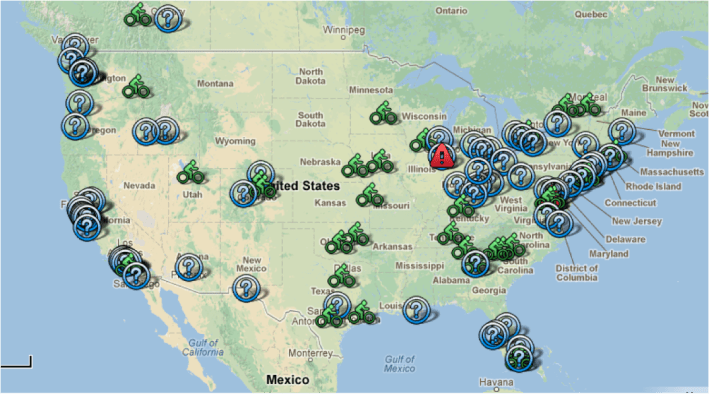
Yesterday was a momentous day for sustainable transportation: New York City launched its Citi Bike system, logging a record-breaking 6,050 trips and 13,768 miles on its first day. Already the biggest bike-share system in the country, it's on track to expand to nearly twice its current size.
Somehow it feels like New York popped the cork and now champagne is bubbling out all over the country. Chicago just got its first look at the bikes for its system, called Divvy, due to launch in June, with memberships going on sale next week. Right across the river from New York, Hoboken is launching a dock-less bike-share system this week. Aspen, Colorado, hops on the bandwagon a week from tomorrow. Columbus, Ohio, should gets its 300 bikes in July.
Los Angeles and Long Beach were supposed to be rolling as of last month, and now it looks like December, maybe. Austin was supposed to launch its system this month but it's been delayed, too.
San Francisco will get its system, at long last, in August, starting with 700 bikes at 70 stations and growing to 1,000 bikes shared with Redwood City, Mountain View, Palo Alto and San Jose. SF has aspirations to increase its number of bikes to 2,750 over the next few years. Meanwhile, Portland will make a bid to reclaim its status as the gold standard for American bicycling when it gets bike-share next spring, but it will be a rather late addition to the bike-share ecosystem.
As bike activist Elly Blue mused in a conversation with Streetsblog recently, "who knew" bike-share was going to be the next ground-breaking innovation in bicycling? When it arrived to DC a few years ago, some cyclists thought, "Well, this is nice for tourists but I already have my bike." Meanwhile, others immediately saw the utility of bike-share for days with unpredictable weather, meet-ups with friends, linking up with transit, and walk-up apartments without bike storage. It was an instant hit, helping to inspire all these other cities to start their own systems.
Bike-share results in an immediate, visible increase in the number of bikes on the road, making everyone safer by putting drivers on alert that they're sharing the street with other modes. And it has countless other benefits too: In DC, it has helped its 22,200 members change transportation habits so much that they've reduced their annual miles driven by more than 198 miles each, on average -- totaling 4.4 million miles not driven each year because of bike-share.
Just imagine how it will transform your city.





